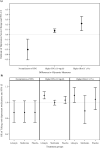Depressive symptoms, antidepressant medication use, and new onset of diabetes in participants of the diabetes prevention program and the diabetes prevention program outcomes study
- PMID: 25775165
- PMCID: PMC4397126
- DOI: 10.1097/PSY.0000000000000156
Depressive symptoms, antidepressant medication use, and new onset of diabetes in participants of the diabetes prevention program and the diabetes prevention program outcomes study
Abstract
Objective: To assess in the Diabetes Prevention Program and Diabetes Prevention Program Outcomes Study whether diagnosis of diabetes predicted elevated depressive symptoms (DS) or use of antidepressant medicine (ADM) following diagnosis; whether diabetes status or duration had significant effect on DS or ADM use; and to determine the associations between A1C, fasting plasma glucose (FPG), normalization of FPG, and DS or ADM use after diagnosis.
Methods: Diabetes Prevention Program participants in three treatment arms (intensive life style, metformin, placebo) were assessed for diabetes, glucose control, ADM use, and DS, measured using the Beck Depression Inventory (BDI). Among 3234 participants, 1285 developed diabetes. Depression levels were measured before and after diabetes diagnosis.
Results: Neither DS nor use of ADM increased after diagnosis; higher FPG was associated with greater ADM use in the intensive life style arm; a 10-mg/dl rise in FPG is associated with greater odds of ADM use. Higher FPG and A1C were associated with higher BDI scores in all three arms; A 10-mg/dl rise in FPG had a 0.07 increase in BDI. A 1% higher A1c was associated with a 0.21-point increase in BDI. Normalization of FPG was associated with lower BDI. When FPG had normalized, there was a decrease of 0.30 points in the BDI score compared when FPG had not normalized.
Conclusions: Contrary to clinical attributions, diabetes diagnosis did not show an immediate impact on BDI scores or ADM use. Higher glucose levels after diagnosis were associated with a small but significantly higher BDI score and more ADM use.
Trial registration: DPPOS: NCT00038727; DPP: NCT00004992.
Conflict of interest statement
Figures


References
-
- Palinkas LA, Barrett-Connor E, Wingard DL. Type 2 diabetes and depressive symptoms in older adults: a population-based study. Diabet Med. 1991 Jul;8(6):532–9. - PubMed
-
- Knol MJ, Twisk JWR, Beekman ATF, Helne RJ, Snoek FJ, Pouwer F. Depression as a risk factor for the onset of type 2 diabetes: A meta-analysis. Diabetologia. 2006;49(5):837–845. - PubMed
-
- Ciechanowski PS, Katon WJ, Russo JE. Depression and diabetes: impact of depressive symptoms on adherence, function, and costs. Archives of Internal Medicine. 2000;160(21):3278–85. - PubMed
-
- Ali S, Stone MA, Peters JL, Davies MJ, Khunti K. The prevalence of co-morbid depression in adults with Type 2 diabetes: a systematic review and meta-analysis. Diabetic Medicine. 2006;23(11):1165–1173. - PubMed
Publication types
MeSH terms
Substances
Associated data
Grants and funding
LinkOut - more resources
Full Text Sources
Medical

